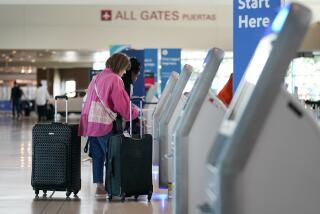Executive Travel : Life Under Commission Caps : Consortium Seeks Swap of Travel Agents’ Fees for Air Fare Discounts
- Share via
The current uproar in the travel agency community over commission caps by airlines may have upset many in the travel industry, but not Kevin Mitchell of the Business Travel Contractors Corp.
Mitchell heads BTCC, a Pennsylvania-based consortium of Fortune 500 companies that is trying to negotiate steep air fare discounts for business travelers in exchange for giving up frequent-flier miles.
The group has proposed that airlines offer corporate travelers a mileage-based fare that eliminates the cost of commissions and frequent-flier miles, a so-called net fare. In exchange for the lower fares, participating corporate members would pay their agents a fee for tickets. Some agencies, such as American Express Travel Agency, have already said they will charge customers fees because of the commission caps.
Under the current ticketing system, most business travelers end up paying the higher fares because of restrictions, such as Saturday-night stay requirements, on discounted fares. In addition, corporations have complained that they don’t benefit from frequent-flier mileage because the miles belong to the individual who flies, not the corporation that pays for the ticket.
“The decision . . . to cap commissions on domestic air travel validates BTCC’s proposal to simplify business travel processes and strip out waste and inefficiency from the distribution system,” Mitchell said.
BTCC submitted its proposal to the Justice Department for review last September to make sure it does not violate antitrust laws. A decision is expected fairly soon, Mitchell said.
Mitchell said he also sees the move to cut commissions as a positive development for BTCC.
“First, commission caps will provide a strong impetus for travel agencies to convert to fee-based pricing, a key element of the BTCC proposal,” he said.
“Second, in effect, it implies that fee-based pricing will work best with true net fares offered by multiple carriers, unbundled of commissions and overrides.” Overrides are an additional commission a carrier pays an agency when the agency brings in enough corporate business to boost the airline’s market share in a particular area.
“Third,” Mitchell said, the commission-cutting move “alerts corporations to the need for greater influence and control over their travel management destinies.” He said he expects that if BTCC’s plan is approved, members could save up to 20% of their travel budgets. The current group members spend about $1.5 billion in travel dollars.
Three more companies have joined the group, bringing membership to 20 members.
The group has also met with foreign flag carriers and government representatives.
In addition, it has expanded its efforts to educate senior airline managers about its proposal, Mitchell said. Airline representatives were initially reluctant to consider any proposal that would eliminate frequent-flier miles, one of their most potent advertising tools.
But Mitchell said attitudes are starting to shift. “Everyone’s got a problem-solving hat on at this point,” he said.
While BTCC is optimistic about a positive Justice Department ruling, others in the industry are not as convinced its proposal will fly.
The American Society of Travel Agents, for example, has appeared before the department committee opposing the proposal.
“BTCC is creating an oligopoly of large corporations that was going to get together and negotiate eyeball-to-eyeball with each carrier,” said Dick Knodt, executive vice president and chief operations officer of the Washington-based ASTA. “We are fundamentally opposed to that on the basis of antitrust considerations.”
*
The ASTA, however, is not opposed to the underlying premise that corporations are paying more for their tickets than they should.
“Everybody thinks these (frequent-flier programs) cost nothing,” he said. “That’s nonsense. They cost a lot.” The traveler paying premium ticket prices is the one bearing that cost, Knodt said.
And now, by cutting commissions, airlines have passed their distribution costs on to the agencies, which will ultimately have to pass them on to consumers, he said. “The price of travel just went up to the ultimate end users.”
The turmoil over commission caps is a harbinger of changes to come. Whether the drive to change will lead airlines to adopt BTCC’s proposal is uncertain.
“The way we have been doing business for the last 30 years is not the way we are going to be doing business,” said Richard Weintraub, spokesman for USAir. “We don’t know for sure where this is all going to lead.”
More to Read
Sign up for The Wild
We’ll help you find the best places to hike, bike and run, as well as the perfect silent spots for meditation and yoga.
You may occasionally receive promotional content from the Los Angeles Times.






